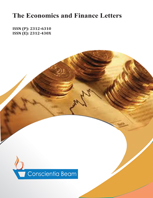Foreign Direct Investment in Zimbabwe: The Role of Uncertainty, Exports, Cost of Capital, Corruption and Market Size
DOI:
https://doi.org/10.18488/journal.29.2019.61.9.24Abstract
Most of developing countries such as Zimbabwe see foreign direct investment as a panacea for augmenting domestic savings, generating employment, eradicating poverty and stimulating economic growth. Foreign direct investment also is associated with significant positive spillover benefits such as; facilitating technological progress, enhancing production efficiencies, promoting skills and knowledge diffusion and increasing international competitiveness. The paper investigated the role of cost of capital, uncertainty, exports, market size and other macro factors in attracting FDI in Zimbabwe. This paper relied on a time series analysis using Ordinary Least Regression equation for the period 1998-2017. Uncertainty and cost of capital were found to be negative and statistically significant whilst market size and lagged exports were found to be positive and statistically significant. The paper recommends adoption of policies that improve domestic absorptive capacity such as the elimination of uncertainties in the economy, promoting more trade openness, improving market size and liberalisation of credit and financial markets to reduce firm borrowing costs.

